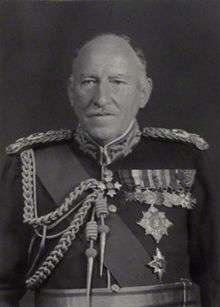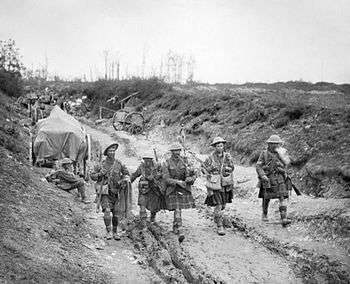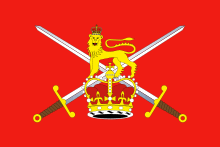Cyril Deverell
| Sir Cyril Deverell | |
|---|---|
 Field Marshal Sir Cyril Deverell in 1936 | |
| Born |
9 November 1874 St Peter Port, Guernsey |
| Died |
12 May 1947 (aged 72) Lymington, Hampshire |
| Allegiance | United Kingdom |
| Service/branch | British Army |
| Years of service | 1895–1937 |
| Rank | Field Marshal |
| Commands held |
Chief of the Imperial General Staff Eastern Command Western Command 53rd (Welsh) Infantry Division 3rd Division |
| Battles/wars |
Fourth Anglo-Ashanti War First World War |
| Awards |
Knight Grand Cross of the Order of the Bath Knight Commander of the Order of the British Empire Mentioned in Despatches Legion of Honour (France) Croix de guerre (France) |
Field Marshal Sir Cyril John Deverell GCB, KBE, ADC, DL (9 November 1874 – 12 May 1947) was a British career military officer who served as Chief of the Imperial General Staff from 1936 to 1937. He fought in the Fourth Anglo-Ashanti War and the First World War and later advised the Government on the importance of maintaining the capability to mount an Expeditionary Force for operations on mainland Europe.
Army career
Born the son of Lieutenant John Baines Seddon Deverell and Harriet Strappini Deverell (née Roberts) and educated at Bedford School,[1] Deverell was commissioned into the Prince of Wales's West Yorkshire Regiment on 6 March 1895.[2] He served in the Fourth Anglo-Ashanti War in 1896[3] and was then promoted to lieutenant on 3 August 1898.[4] He was appointed adjutant of his Regiment on 9 February 1904[5] before being promoted to captain on 23 February 1904.[6]
He served in the First World War initially as brigade major for 85th Brigade,[7] in which role he joined the British Expeditionary Force and saw action at the Second Battle of Ypres in April 1915 before being promoted to major on 3 June 1915.[3]

Deverell became Commanding Officer of 4th Battalion, the East Yorkshire Regiment in July 1915 and was then asked to command the 20th Brigade from 29 October 1915.[3][8] Promoted to lieutenant colonel on 26 August 1916, he took part in the Battle of the Somme in Autumn 1916.[3] It held a position on the 21st Division's right flank during the Battle of Bazentin Ridge and attacked the Switch Line to the east of High Wood; one of Deverell's men, Theodore Veale, won the Victoria Cross during this action.[9] Promoted to the substantive rank of colonel and temporary major general on 1 January 1917, Deverell was given command of the 3rd Division[3] after its commander, Sir Aylmer Haldane, took over VI Corps.
He led the division at Arras in 1917, then participated in the latter stages of the Battle of Passchendaele.[10] He returned to the Somme in 1918, before fighting alongside the Portuguese at the Battle of the Lys.[11] The division participated in the Hundred Days Offensive, finally leading to the German surrender on 11 November 1918.[10] He was appointed a Companion of the Order of the Bath in 1918[1] and awarded the Croix de guerre in 1919.[12]
He commanded that division until 1 January 1919, when, having been promoted to substantive major genera], he took over command of the 53rd (Welsh) Division.[10] On 13 December 1921 he moved to India where he commanded the United Provinces District.[13] Having been appointed a Knight Commander of the Order of the British Empire in the 1926 Birthday Honours,[14] he served as Quartermaster-General of India from 25 February 1927[15] and, having been promoted to lieutenant general on 13 March 1928[16] and advanced to Knight Commander of the Order of the Bath in the Kings Birthday Honours 1929,[17] he became Chief of the General Staff in India in 1930.[10] He became General Officer Commanding-in-Chief of Western Command on 11 April 1931[18] and then, having been promoted to general on 21 April 1933,[19] he was appointed General Officer Commanding-in-Chief of Eastern Command on 8 May 1933.[20] He was appointed Aide-de-Camp General to the King on 10 February 1934[21] and promoted to field marshal on 15 May 1936[22] before assuming the position of Chief of the Imperial General Staff that same day.[10] In that capacity he advised the Government on the importance of maintaining the capability to mount an Expeditionary Force for operations on mainland Europe.[10] In May 1937 Leslie Hore-Belisha, the newly appointed Secretary of State for War, sought to implement a new policy of limiting expenditure on the army, particularly on tanks, and when Deverall failed to show enthusiasm for that policy in the context of an increasing threat from Germany, Hore-Belisha wrote to him, advising him that he had been removed from office.[1] Deverell wrote a reply to the Secretary of State, strongly objecting to the adverse comments that had been made on his own performance, and retired from the British Army on 6 December 1937.[23]
He was also Colonel of the Prince of Wales's West Yorkshire Regiment from 21 March 1934.[24]
In retirement he became Deputy Lieutenant of Southampton.[25] His interests included local politics; he served on the borough council and chaired the local defence committee during the Second World War.[1] He lived at Court Lodge in Lymington and died there on 12 May 1947.[10] He was cremated at Bournemouth crematorium.[26]
Family
In 1902 he married Hilda Grant-Dalton; they had a son and a daughter.[3]
References
- 1 2 3 4 "Cyril Deverell". Oxford Dictionary of National Biography. Retrieved 8 January 2012.
- ↑ The London Gazette: no. 26604. p. 1319. 5 March 1895. Retrieved 2012-01-08.
- 1 2 3 4 5 6 Heathcote, Anthony pg 101
- ↑ The London Gazette: no. 27002. p. 5322. 6 September 1898. Retrieved 2012-01-08.
- ↑ The London Gazette: no. 27643. p. 861. 9 February 1904. Retrieved 2012-01-08.
- ↑ The London Gazette: no. 27664. p. 2196. 5 April 1904. Retrieved 2012-01-08.
- ↑ The London Gazette: no. 29035. p. 278. 8 January 1915. Retrieved 2012-01-08.
- ↑ The London Gazette: (Supplement) no. 29380. p. 11734. 23 November 1915. Retrieved 2012-01-08.
- ↑ Dartmouth memorial
- 1 2 3 4 5 6 7 Heathcote, Anthony pg 102
- ↑ "Sir Douglas Haig's Despatch on the German spring offensive". The Long, Long Trail. Retrieved 8 January 2012.
- ↑ The London Gazette: (Supplement) no. 31514. p. 10607. 19 August 1919. Retrieved 2012-01-08.
- ↑ The London Gazette: no. 32631. p. 1954. 7 March 1922. Retrieved 2012-01-08.
- ↑ The London Gazette: (Supplement) no. 33179. p. 4407. 2 July 1926. Retrieved 2012-01-08.
- ↑ The London Gazette: no. 33270. p. 2770. 29 April 1927. Retrieved 2012-01-08.
- ↑ The London Gazette: no. 33374. p. 2634. 10 April 1928. Retrieved 2012-01-08.
- ↑ The London Gazette: (Supplement) no. 33501. p. 3668. 31 May 1929. Retrieved 2012-01-08.
- ↑ The London Gazette: no. 33708. p. 2492. 17 April 1931. Retrieved 2012-01-08.
- ↑ The London Gazette: no. 33936. p. 2937. 2 May 1933. Retrieved 2012-01-08.
- ↑ The London Gazette: no. 33939. p. 3204. 12 May 1933. Retrieved 2012-01-08.
- ↑ The London Gazette: no. 34030. p. 1530. 6 March 1934. Retrieved 2012-01-08.
- ↑ The London Gazette: no. 34297. p. 4017. 23 June 1936. Retrieved 2012-01-08.
- ↑ The London Gazette: no. 34464. p. 7917. 17 December 1937. Retrieved 2012-01-08.
- ↑ The London Gazette: no. 34046. p. 2789. 1 May 1934. Retrieved 2012-01-08.
- ↑ The London Gazette: no. 35161. p. 2744. 13 May 1941. Retrieved 2012-01-08.
- ↑ "CWGC Casualty Record". Retrieved 27 December 2013.
Further reading
- Heathcote, Tony (1999). The British Field Marshals 1736–1997. Barnsley (UK): Pen & Sword. ISBN 0-85052-696-5.
External links
| Military offices | ||
|---|---|---|
| Preceded by Aylmer Haldane |
General Officer Commanding the 3rd Division 1916–1919 |
Succeeded by Robert Whigham |
| Preceded by Sir Philip Chetwode |
Chief of the General Staff (India) 1930–1931 |
Succeeded by Sir Kenneth Wigram |
| Preceded by Sir Cecil Romer |
GOC-in-C Western Command 1931–1933 |
Succeeded by Sir Walter Kirke |
| Preceded by Sir Webb Gillman |
GOC-in-C Eastern Command 1933–1936 |
Succeeded by Sir Edmund Ironside |
| Preceded by Sir Archibald Montgomery-Massingberd |
Chief of the Imperial General Staff 1936–1937 |
Succeeded by The Viscount Gort |
